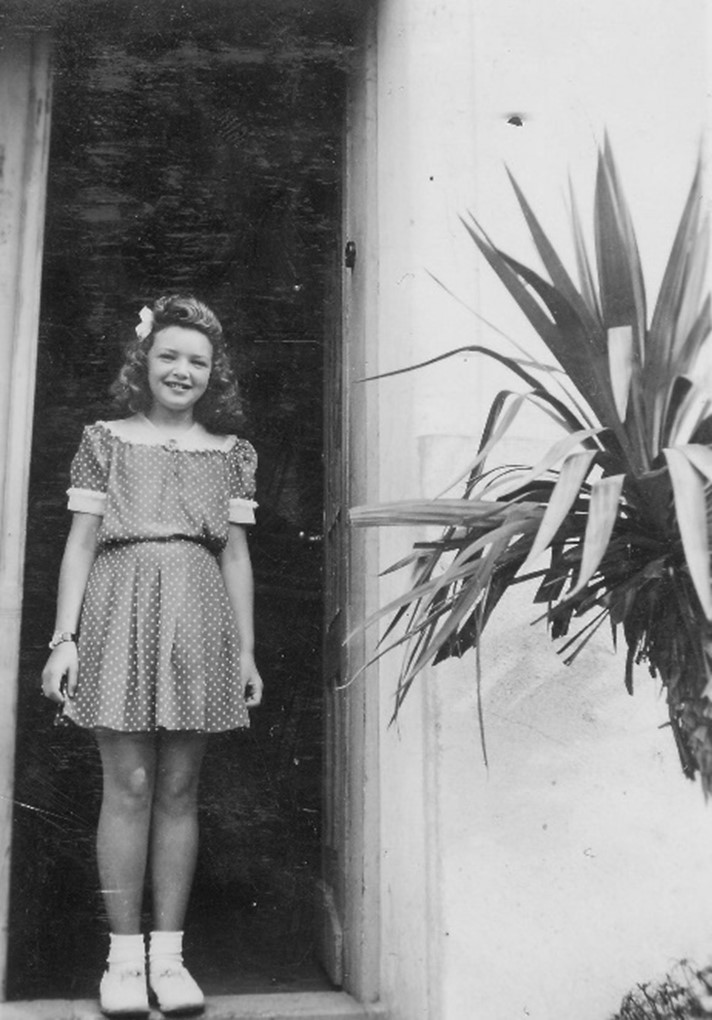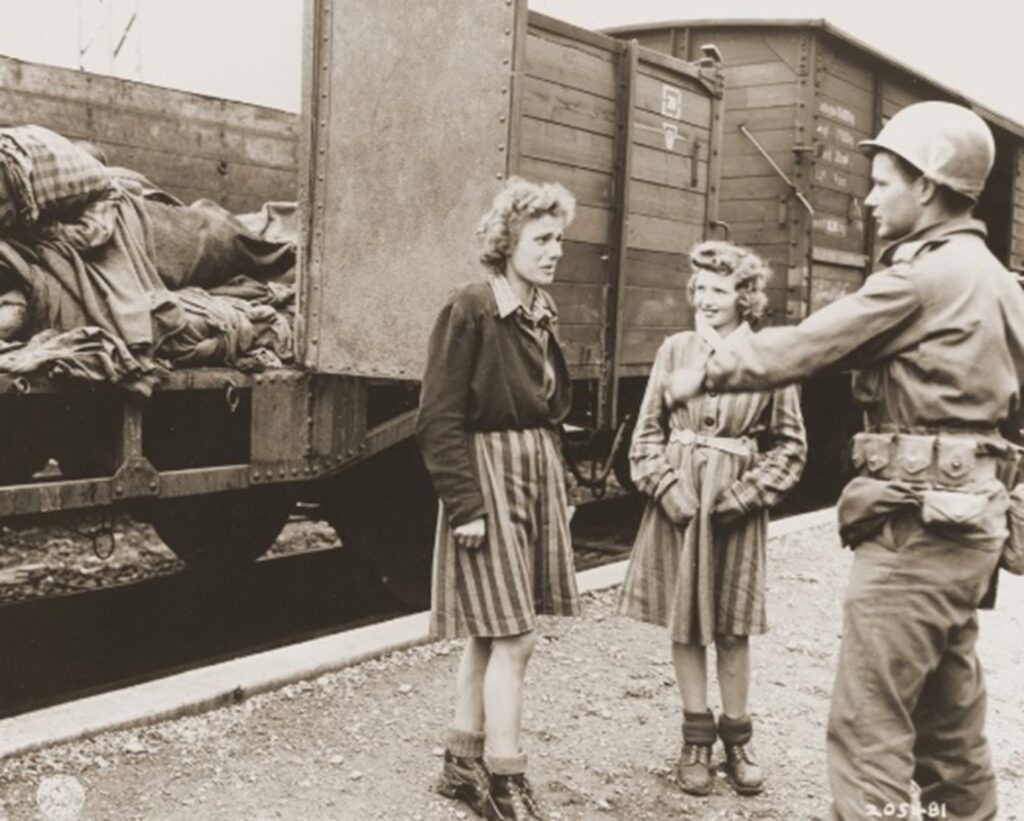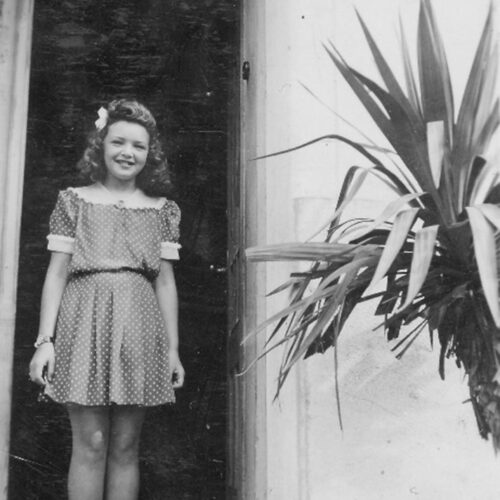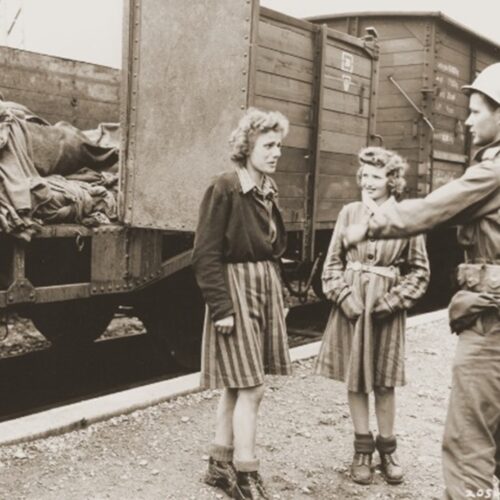
Sarika Hahn
Sarika (Charlotte) Hahn, married Horvat

Sarika Hahn, born 28.07.1928 in Murska Sobota
Mother: Irena Kemeny- Hahn, born 1902
Father: Izidor Hahn, born 26.03.1893
Sarika Hahn was born on July 28, 1928, in the small town of Murska Sobota to a Jewish family. She was the daughter of Izidor Hahn and Irena Hahn, née Kemeny. She grew up in a respected and socially active family. Her father owned a printing shop, a bookstore, and a bookbinding shop. He was also involved in the social and cultural life of the Prekmurje region. This region in Slovenia was under Hungarian occupation from 1941 to 1944. During this time, Jewish families in Prekmurje lived under certain restrictions, but without mass deportations.
Sarika (Charlotte) Hahn – Horvat (1928-2000)
On April 26, 1944, immediately after the fall of the Horthy regime, the deportations of Jews from Prekmurje to Auschwitz began. Of the approximately 500 Jews from the region, only 25 returned.
First, they were taken from Murska Sobota to a collection camp in Nagykanizsa (Hungary), where they stayed for several weeks. This was followed by transport to Auschwitz.
Upon arrival in Auschwitz, Josef Mengele separated Sarika from her mother and brother Andrej, who were immediately sent to the gas chambers. Sarika survived six weeks of quarantine, after which she was selected for forced labor in Geislingen, near Stuttgart, where she worked in a weapons factory (WMF). Her memories of this time were recorded in 1996 by the Visual History Foundation as part of the “Survivors of the Shoah” project.
In her report, she emphasizes that she survived thanks to the support of a guard named Berta Pommer, among others. Pommer protected Sarika, brought her medicine and food, while being very cruel to others. Sarika never understood why she, of all people, won the favor of this strict woman.
Shortly before the end of the war, she was transferred from Geislingen to Dachau-Allach. At the end of April 1945, she was loaded onto a train with other prisoners, which stopped in Seeshaupt, where she was liberated by the American army on April 30. There is a photo and a video of this moment, showing Sarika (in the middle) standing with another survivor in front of a wagon full of corpses, together with Pfc. Andrew E. Dubill. These are now part of the collection of the Yad Vashem Museum in Jerusalem and the USHM in Washington, and were also shown at the Museum of Photography in Berlin (photo: Al Gretz, May 1, 1945).

Her father Izidor did not return from the camp. Documents from the Auschwitz archives and a Czech police report from 1945 show that he died on a so-called “death march” and is buried in Budweis (Ceska Budejovice).
After the war, Sarika returned to her parents’ house, which had been looted and later nationalized. She lived modestly, became a housewife, married Stefan Horvat in 1948, and started a family with a son, Andrej, and a daughter, Irena. She lived in Murska Sobota until her death in 2000 and left behind four grandchildren.
Although she rarely spoke about her time in the camp, her few notes and testimonies are a valuable source of information about the fate of the Jews from Prekmurje and their marginalization (relegation to the fringes of society) after the war. Her life story is an important testimony to the Holocaust and to how people continue to live in silence and with suppressed pain.
Quote from her testimony:
“It was hard, it was terrible. A human being can endure more than an animal. When I arrived at the small camp in Germany, I felt better. We had to work in the factory. In winter we had no socks, only wooden shoes and striped clothing. It was terribly cold. But we could eat in the factory canteen. We got their food, which was pretty good for a camp. There were SS guards in the factory. One of them saw that I couldn’t work—I had to file something. I was in very bad shape and she told me to come to her. She gave me a new task. I had to distribute food and clean the toilets. And this woman, this SS guard, liked me. Imagine that. She was usually cruel, terrible, the worst. But when she saw me, her expression changed. She always brought me something to eat and medicine.
One of the prisoners was older than me and wanted to commit suicide. She threw herself against the electric fence. Our women saved her. The men suffered more than the women. They needed more food and had to work harder.
That was Geislingen, near Stuttgart, a small town. There weren’t many of us in the camp, there weren’t many barracks. We worked in two shifts, during the day and at night. I think it was a small camp. Once I met someone from Geislingen by the sea in Croatia and asked if the camp was still standing. He replied curtly that he knew nothing about a camp or a factory there. It was a large factory that had been converted for the production of ammunition. I only made ammunition.
I shared a room with a woman from Slovakia. She was different from me, an Orthodox Jew. I saw such customs there for the first time because we were not religious at home. We were very close. She also didn’t have a mother. I don’t remember how she felt about her mother. Maybe she told me. We were given a lot of bromide in our food, a kind of sedative, so that we wouldn’t be so sensitive. We didn’t have our periods, so they had to give us something. Some of the older women said that was the reason we were so indifferent. We only talked about food with the other women. We were constantly thinking about food because we were hungry.
I wasn’t looking for anyone to replace my mother. Only one older woman from Murska Sobota worked in the office because she spoke German well. I told the SS guard that she was my cousin. She went to the office with me several times so that I could visit her.
This woman, the SS guard, helped me. She even took me to her home and cooked for me. She didn’t live alone; she had a husband who also worked in the factory. She was very vulgar; I learned to swear from her. They called her “Bromml”; I don’t know her real name. I didn’t want to know it anyway. To this day, I still don’t understand why she took such good care of me. She had older children and was quite old. Before we were taken on to Dachau, she came to say goodbye to me. Maybe she felt sorry for me. She was cruel to the others. She yelled at them, hit them, and had a whip. That’s why I don’t understand why she helped me.
Then we went to Allach. It was terrible there. We thought they were going to kill us all. We didn’t have to work there. We had no food and ate nettles. Then we were crammed into wagons again, a terribly long train, and traveled for several days. Then the Americans liberated us. I didn’t get out of the wagon; I was too afraid. I had a Czech friend, and I held on to her.”
Written by her granddaughter Sasa Savel-Burkart




